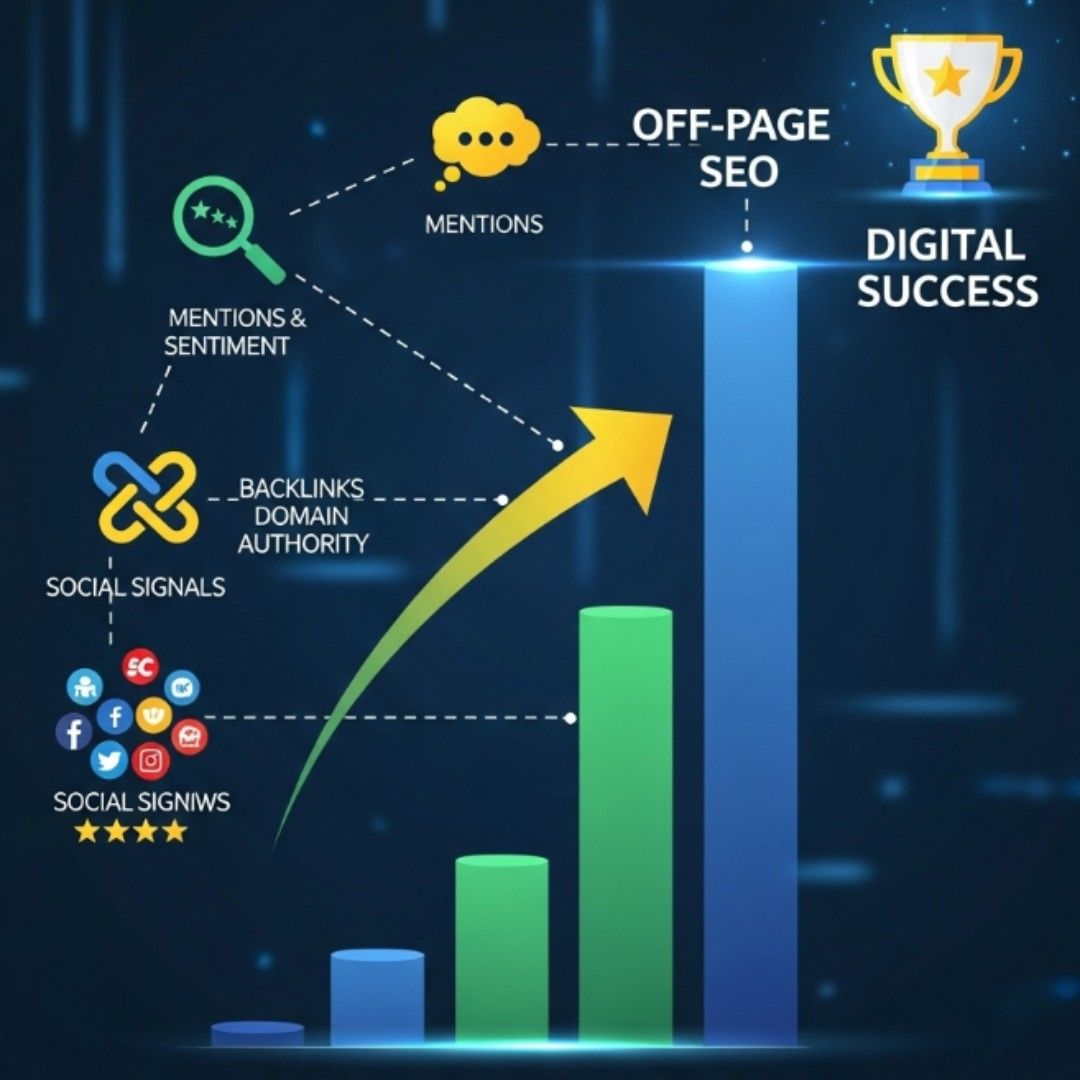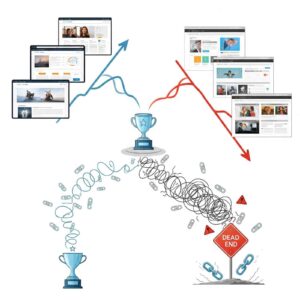Why Off-Page SEO Is Critical for Digital Success
Most businesses focus heavily on on-page SEO—optimizing site design, headings, and keywords—but ignore the silent powerhouse behind strong rankings: off-page SEO. Without it, your website can look perfect but still struggle to gain visibility.
Off-page SEO is the hidden driver of sustainable rankings, organic traffic, and brand reputation. Here are six reasons why it remains crucial for any digital marketing strategy.
1. Off-Page SEO Boosts Website Authority and Credibility
Search engines like Google rely on off-page signals to measure how trustworthy your site is. Without external votes of confidence from backlinks, even the most optimized website can struggle to climb the search engine rankings.
According to Backlinko, the #1 Google result has 3.8x more backlinks than results in positions 2–10 combined. Ahrefs reports that 66% of pages have zero backlinks—and they also receive no organic traffic.
When high-authority websites (DA 70+) link to your content:
Search engines assume your site is valuable.
Users trust your brand more.
Table: Impact of Backlinks on Ranking Potential
| Backlink Quality | Ranking Impact | Example |
|---|---|---|
| High-Authority Websites | Extremely High | Forbes linking to a finance blog |
| Niche-Relevant Blogs | High | A health blog linking to a yoga website |
| Low-Quality Directories | Very Low | Random submission sites linking sporadically |
A strong link-building strategy significantly increases your domain authority, leading to better keyword rankings.
2. Off-Page SEO Improves Organic Rankings
Climbing Google’s SERPs without backlinks is nearly impossible today. Off-page SEO is one of the top three ranking factors—alongside content and user engagement signals.
Real-World Example:
A boutique coffee roaster consistently published high-quality content marketing articles and partnered with a food influencer. After the influencer linked to their site, their ranking for “best organic coffee beans” jumped from page three to position five in two months.
Why Off-Page SEO Matters:
Google treats backlinks as trust signals.
Natural mentions show relevance and freshness.
Strong off-page strategies shorten the time needed to see results.
3. Expands Brand Reach Beyond Your Website
Off-page SEO helps your business show up where your audience already spends time—blogs, forums, podcasts, and influencer channels—spreading your brand voice across the web.
Examples of Off-Page Tactics:
Publishing guest posts on niche websites
Appearing on industry podcasts
Participating in discussions on Quora or Reddit
Collaborating with micro-influencers for genuine mentions
Real Example:
Canva grew rapidly not only through ads but by being featured in design blogs, newsletters, and user-generated YouTube reviews. This off-page visibility made Canva a globally recognized brand.
4. Attracts Highly Targeted Referral Traffic
Strategic link placements on relevant sites send pre-qualified visitors to your website—people already interested in your product or service.
Key Data:
Referral traffic has a 37% higher retention rate (ReferralRock).
Referral visitors convert 4x better than paid ad traffic (Demand Metric).
Example:
An organic pet food brand gets a product review on a popular sustainable living blog. The readers clicking through are eco-conscious pet owners—highly likely to convert.
Table: Traffic Source Comparison
| Source Type | Conversion Potential | Engagement Rate | Example |
|---|---|---|---|
| Referral | Extremely High | Very High | Guest post link on niche blog |
| Paid Ads | Medium | Medium | Facebook ad to cold audience |
| Organic Search | High | Variable | Google SERP click |
Referral traffic not only converts better but also increases average order value and brand loyalty.
5. Builds a Strong, Authentic Online Reputation
Modern buyers care about a brand’s reputation before they trust it. They check reviews, social mentions, and other external signals.
Important Statistics:
87% of consumers read online reviews for local businesses (BrightLocal).
79% trust online reviews as much as personal recommendations.
Off-Page Reputation-Building Strategies:
Encourage Google reviews from satisfied customers
Actively respond on Yelp, Trustpilot, and Amazon
Collaborate with bloggers for honest reviews
Get featured in industry awards or local media
Example:
A small skincare brand was reviewed by multiple beauty bloggers. Within months, they ranked for “best organic night cream,” thanks to backlinks and positive sentiment across third-party platforms.
6. Protects Your Rankings from Google Updates
Google’s algorithm updates punish sites with weak or spammy profiles. A solid off-page SEO strategy helps your rankings stay stable.
Case Study:
During Google’s 2018 Medic Update, low-authority health websites lost up to 50% of traffic, while well-cited sites like WebMD gained more visibility.
Table: Outcome After Google Updates
| Website Type | Post-Update Impact | Reason |
|---|---|---|
| Weak Backlink Profile | Major Traffic Loss | Low authority and trust |
| Strong Backlink Profile | Minimal Loss/Gain | Trusted by Google with strong signals |
Investing in link-building and brand authority future-proofs your website against unpredictable algorithm shifts.
Final Thoughts
Ignoring off-page SEO is like building a five-star hotel on an invisible island—beautiful, but without visitors. Without backlinks and external trust signals, even great content remains unseen.
A trusted agency like Web Conquerors LLC can help with global and local SEO strategies in San Antonio, TX. Through off-page SEO, backlinking, and digital marketing services, we can help your brand secure top positions on Google and stay there.





